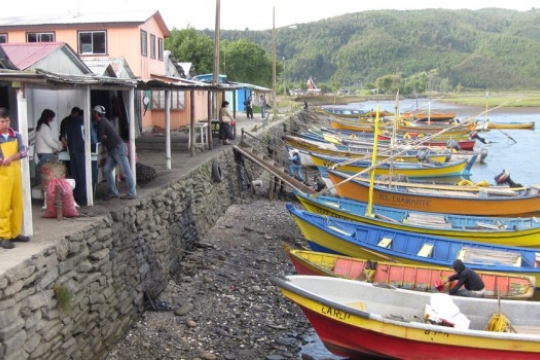A task team of international and local fisheries experts, including an EfD researcher, recently assisted the Chilean government with an extensive review of a new fisheries law, in a bid to help the administration address public concerns that an important amendment to this law was tainted with corruption.
In 2013, the Chilean parliament approved an amendment to the country’s General Fisheries and Aquaculture Law (GFAL).
But this law quickly became discredited when it emerged that some legislators had accepted bribes from fishing companies who wanted them to vote in favor of aspects of the law that would benefit the companies’ interests. Several of the legislators were impeached following an investigation by the public prosecutor, and criminally charged with fraud, bribery, and fiscal crimes.
The general distrust of the law, and its eventual rejection by the public, could have created a legal vacuum in fisheries administration and a setback in the management of fisheries in Chile. As a way out of this situation, the Chilean government called on the regional office of the United Nations’ Food and Agriculture Organization (FAO) to draw together a team of specialists in economic, public, and social management of the fisheries sector, in order to assist with a review of the GFAL.
The Nucleus in Environmental and Natural Resource Economics (NENRE) at the Universidad de Concepción contributed to the team, based on the unit’s expertise in the design and socioeconomic consequences of regulatory systems in fisheries. NENRE is the Chilean chapter of the Swedish-based Environment for Development (EfD) initiative, a policy-oriented international network of academic research centers focusing on the nexus between environmental and development problems.
The review found that, although important progress had been made to align Chilean legislation with international instruments, guidelines, and best practices for fisheries management in recent years, there were still some important gaps to be filled in the GFAL.
For instance, although the FAO’s Ecosystem Approach to Fisheries Management had been declared as a principle, it was not implemented in practice. Moreover, the ancestral rights of indigenous people were not considered. Furthermore, some basic principles, such as responsible governance, awareness of climate change, and food security, were not acknowledged.
Perhaps more importantly, the review set the agenda for those technical aspects of the law that should be amended and that now are part of the public discussion of a new fisheries law in Chile.
Because the review was backed up by the FAO and supported by a technically competent and credible team of scientists, it helped the Chilean government to redirect the public debate from the illegitimate nature of the fisheries law amendment to the modifications required to modernize this law.
Building credibility for the law
The Chilean authorities, as a means to channel the discontent, asked the FAO for technical assistance to review the new law in light of international instruments and best practices for sustainability and governance of the fishing sector. The Chilean government also committed to follow the recommendations that would emerge from this independent review.
The FAO-appointed task team included an international expert in comparative fisheries law from the United States, along with two Chilean researchers, one of whom is from the NENRE group and specializes in regulatory systems for fisheries and aquaculture from a socioeconomic perspective.
NENRE has a long history of developing applied research in the field and of interacting with policy makers in different matters related to fisheries management.
As part of the review process, the task team also held 27 focus groups around the country, where they consulted with the representatives of different stakeholders in the fisheries sector. In the process, participants gave their opinions about what legal changes were needed in the GFAL.
The task team used this feedback in their analysis of the law, and incorporated the summaries obtained from each focus group as annexes in the final report without any modifications. The exchange with the stakeholders was considered important as a means of addressing both the consensual and the controversial issues. It was also a way of collecting suggestions and proposals for changes, which turned out to be useful for the analysis of the law presented in the final report. This report was delivered to the Chilean government in October 2016 and now constitutes the basis for the ongoing discussion about reforms to introduce in the GFAL.
By By Jorge Dresdner-Cid

